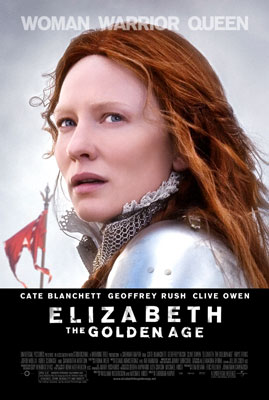 When it was announced that Cate Blanchett would reprise her role as The Virgin Queen in a sequel to 1998’s Elizabeth (the film that vaulted her to international movie star status), there was much rejoicing amongst Anglophiles. Not only were they getting the 329th variation on the life of The Queen That Saved England (sans the assistance of Medowlark Lemmon), here also was a rare opportunity to undo the egregious snubbing of the Great Cate in favor of that entitled bitch Gwyneth Paltrow (she of the infuriatingly affected English accent). And for the same role! Not since Francis Ford Coppola pulled Al Pacino back in as Michael Corleone has the Academy had such an ideal chance to right itself.
When it was announced that Cate Blanchett would reprise her role as The Virgin Queen in a sequel to 1998’s Elizabeth (the film that vaulted her to international movie star status), there was much rejoicing amongst Anglophiles. Not only were they getting the 329th variation on the life of The Queen That Saved England (sans the assistance of Medowlark Lemmon), here also was a rare opportunity to undo the egregious snubbing of the Great Cate in favor of that entitled bitch Gwyneth Paltrow (she of the infuriatingly affected English accent). And for the same role! Not since Francis Ford Coppola pulled Al Pacino back in as Michael Corleone has the Academy had such an ideal chance to right itself.
But just as Pacino was passed over yet again in 1991 (matter of fact, he wasn’t even nominated), Blanchett will likely go wanting yet again; Elizabeth: The Golden Age might’ve looked like a sure thing on the page, but it’s a gaudy mess on its feet. And if it sounds obscene to gauge the quality of this picture as it relates to its Oscar chances, that’s really all there is to go on. The whole point of the production is brazenly twofold: win Blanchett a Best Actress trophy and resurrect the career of Shekhar Kapur.
It’s the latter aspiration that proves the film’s undoing. The Golden Age makes the stylistic excesses of Elizabeth and The Four Feathers look positively Rohmer-ian; if Kapur came off as a third-rate Ridley Scott in the past, he’s now at best a second-rate Simon West (sorry, but Con Air is better on its own terms than anything in Kapur’s oeuvre). Blissfully unencumbered by theme, accuracy or narrative coherence, Kapur skips from one Major Historical Incident to another as if the sheer power of camp will be enough to enrapture audiences; unfortunately, rudimentary skills like camera placement seem to be kicking his ass this time out. Consider the scene where Elizabeth’s lady-in-waiting, Bess Throckmorton (Abbie Cornish), sneaks off to meet with Sir Walter Raleigh (Clive Owen) aboard his ship. As Raleigh regurgitates a bunch of trite nonsense about the boat and the ocean being all the home he requires (the screenplay by William Nicholson and Michael Hirst is crammed with such shopworn garbage), he walks Bess to the side of his ship. Kapur then reverses to an angle outside of the boat, which would be a perfectly acceptable cut had he not framed the ensuing shot with Raleigh and Bess in the extreme top left-hand corner of the screen, thus filling the rest of the frame with nothin’ but boat. One might argue that this preponderance of vessel emphasizes the craft’s importance in Raleigh’s life; be that as it may, there’s a more artful way of conveying what he’s already told us than giving the audience a face full of teak.
If this were an isolated incident, it would be forgivable, but Kapur insists on throwing walls and other large impediments directly in the viewer’s line of sight whilst attempting to pull off half-assed deep-focus photography. This isn’t to suggest that Kapur’s cloddishness is unremitting; he does occasionally cut back on the ostentation, thereby allowing the actors to inhabit Remi Adefarasin’s beautifully lit environs. It’s difficult to ascertain to what extent the The Golden Age would’ve been more watchable had Kapur evinced some manner of restraint with his visuals; though the screenplay is riddled with insipid, practically boilerplate proclamations (half the time I felt like I was watching auditions for a community theater production of Our Country’s Good), actors like Blanchett, Owen, Cornish, (who continues to prove Somersault was no fluke) and that Geoffrey Rush guy do have a way of invigorating humdrum material.
But they never get the chance because Kapur and his screenwriters have crammed close to three hour’s worth of narrative into a two hour film. The primary external conflict is Spain’s King Philip II (a crazed Jordi Molla) spoiling for war and conspiring to install Mary Stuart (an even more crazed Samantha Morton) as the Queen of England, but the fascinating political machinations a rushed through so Kapur can attend to the unrequited romance between Elizabeth and Raleigh. Things finally get irredeemably silly when Kapur launches Raleigh into action in a Master and Commander-esque finale that’s staged with all the flair of a five-year-old knocking boats around in the bathtub. It’s hard to tell which is carried off worse: the CG Spanish Armada or Raleigh’s soundstage heroics (complemented by a white steed diving ever so symbolically into the ocean).
Somehow, Blanchett might’ve survived all of this to claim her rightful Best Actress trophy were it not for her momentous Henry V rallying address to her troops. Clad in shimmering silver armor, with her crimson tresses fluttering in the ocean breeze, Blanchett rides up to her awestruck charges, ready to unleash a humdinger of a speech. Even though the turnout is shockingly light (what happened to the old "augment the light extras call with CG combatants" trick?), the moment is still charged. But just as Blanchett lights into her monologue, Kapur cuts to a shot of her riding away from the camera, leaving the viewer looking at that ever winning combination of noticeable ADR and a horse’s ass. And all is lost.